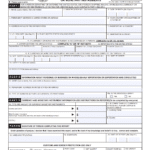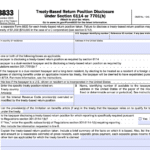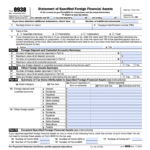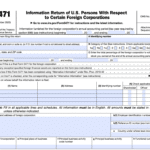Farhy v. Commissioner In a recent landmark ruling, Farhy v. Commissioner, the Tax Court has significantly changed penalty assessments under I.R.C. Section 6038(b) of the Internal Revenue Code. This ruling, rendered on April 3, 2023, carries significant implications for a broad range of taxpayers, potentially offering a basis to challenge or request refunds for penalties
international tax
What You Need to Know About FinCEN Form 105 – Importing Currency into the United States
What You Need to Know About FinCEN Form 105 As a city with a direct border to Mexico, San Diego is a popular destination for our Mexican neighbors who need to know about the FinCen Form 105 in order to bring currency into the United States for business or personal use. Those planning to import
Leveraging the Benefits of Form 8833 for International Tax Treatment
The International Tax Law Team at RJS LAW receives numerous inquiries regarding a crucial yet often misunderstood element of United States tax law — IRS Form 8833, or the Treaty-Based Return Position Disclosure. For taxpayers engaged in global transactions, Form 8833 is significant as cross border transactions are often regulated by international tax treaties. What
Supreme Court Resolves FBAR Penalty Dispute: Per-Report Basis Confirmed
Introduction to the FBAR Penalty Dispute: In a significant decision, the U.S. Supreme Court recently ruled the penalty for violating the “Report of Foreign Bank and Financial Accounts” (FBAR) rules applies on a per-report basis, rather than a per-account basis. This decision brings clarity to a previously divided area of law, as the Fifth Circuit
FBAR – Foreign Bank Accounts Require Disclosure
FBAR – Foreign Bank Accounts Require Disclosure If you are U.S. Citizen or a Green Card holder and you have a bank account outside the United States, your foreign bank account(s) requires disclosure to the Internal Revenue Service (IRS) and the Financial Crimes Enforcement Network (FinCEN) through Form FinCEN 114 or FBAR. Every U.S. Citizen
Tax Treaty Provisions Are an Important Part of International Tax Reporting File IRS Form 8833 to Avoid Penalties!
What is a Tax Treaty? A tax treaty is an agreement between two countries intended to address and resolve issues such as double taxation of income for each country’s citizens or residents. The United States has tax treaties in place with numerous countries. These treaties seek to provide reciprocal reduced tax rates or exemptions for
Breaking Down the Attorney Client Privilege Break Down
Attorney Client Privilege The concept of attorney client privilege as we know it could be shifting in the Ninth Circuit. The 1981 case Upjohn Co. v. United States determined the purpose of attorney client privilege is to “encourage full and frank communication between attorneys and their clients.”1 However, when it comes to legal tax professionals
Internal Revenue Service Form 8938
An Important International Tax Form to Declare Foreign Financial Assets May be filed through the IRS Streamlined Procedures What is it Internal Revenue Form 8938? Form 8938 is used to report specified foreign financial assets when the overall value of the those specified foreign financial assets is over the appropriate reporting thresholds. The form requires
Complying with International Tax Reporting Requirements – Streamlined Procedures May Help
Streamlined Procedures – What Is It and Who Does It Assist? Streamlined Procedures may provide non-tax-compliant US citizens a remedy when the conduct was non-willful. The Streamline includes procedures and terms for filing amended or delinquent returns and for resolving open tax and penalty obligations. Part of the process includes filing three years of income
Do You Own A Foreign Corporation? Have You Filed IRS Form 5471?
What is a Form 5471? IRS form 5471 is a form issued by the Internal Revenue Service (IRS). Form 5471 – Information Return of U.S. Persons With Respect to Certain Foreign Corporations must be completed and filed by certain taxpayers to report ownership of a foreign corporation. Who Must File Form 5471 and When? There










